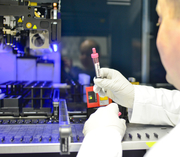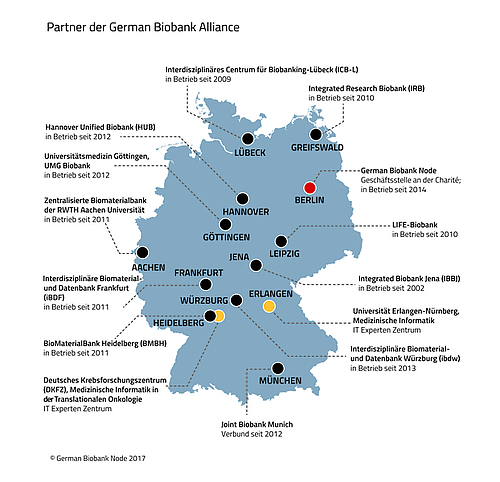"Networked, high modern biobanks make a decisive contribution to develop innovative diagnostic methods and therapies for the treatment of patients," explains Prof. Dr. Thomas Illig, Director of the Hannover Unified Biobank (HUB). Biobanks collect and store blood, tissue, and other biomaterial and provide it for biomedical research. This results in important sample and data stores for the investigation of diseases. HUB is the central biobank of the Hannover Medical School. It is located in the CRC Hannover, offers high quality standards for sample processing and storage as well as for data management. The HUB is DIN / ISO 9001 certified and is currently involved in more than 70 different studies in which biomaterials are generated. A total of more than 1 million samples are currently managed by HUB.
Biobanks are an essential foundation for biomedical research
In order to allow the exchange of biomaterials and their associated data between German biobanks and within Europe, a comprehensive harmonization process is necessary. Standards for the exchange of data and the quality of the biomaterials as well as ethical and legal aspects have to be discussed and adjusted. This is the only way to combine biomaterial and its data on biobanks and national borders for research.
Biobanks accelerate the development of new diagnostics and therapeutics
"The effort is it worth, because networked biobanks with a high sample quality are the basis for a meaningful, reproducible medical research," explains coordinator of the GBA, Prof. Dr. Michael Hummel. The quality and availability of biomaterials and associated data are crucial. Precisely in terms of individualized precision medicine, the networking of biobanks and the harmonization of data formats and processes is essential in order to carry out meaningful and comparable analyzes. "The German Biobank Alliance is an excellent opportunity for the biobank community in Germany," says Prof. Michael Hummel. "It will help accelerate biomedical research in the long-term and strengthen the position of Germany in the European and international research community."
About the German Biobank Alliance
The German Biobank Alliance was initiated in 2017 by the German Biobank Node (GBN). Supported by the Federal Ministry of Education and Research (BMBF), GBN sees itself as a central cooperation platform for the German biobank community. Under the umbrella of GBN, eleven BMBF-funded biobanks and two IT development centers are working together in the German Biobank Alliance (GBA) to make existing biomaterials of various biobanks available across Europe for biomedical research.
The German Biobank Alliance at a glance
Eleven German biobanks have joined together in the German Biobank Alliance (GBA). Together, they store almost 14 million biosamples, which are available for research. By 2020, they will work on the fact that these samples and data can be exchanged between biobanks in Germany and Europe. Common IT infrastructures will be developed, quality standards will be implemented and legal and ethical standards will be harmonized.
Biobanking link: www.bbmri.de

